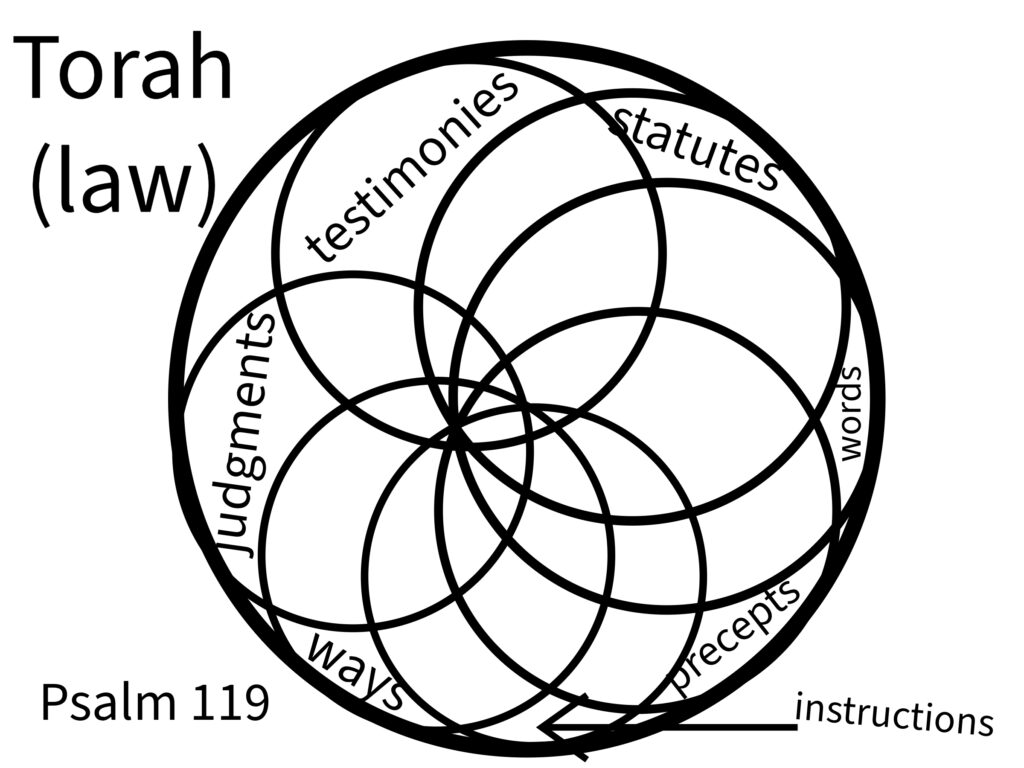Law and Laws in Scripture
In my current series on Psalm 119, I’m doing a daily meditation on each verse. These are, by design, short. At the same time, it’s difficult to cover certain nuances effectively in individual posts. One of these is the question of why I would write this particular series.
I’ve already included my video on the various uses of “law” and related terms in scripture. I’m embedding it here again.
God’s Eternal Law
To summarize this, I believe that God has an eternal law. That eternal law is not something that we can comprehend. It rules an entire universe. It is an absolute expression of who God is. Those of us who are not in that “space,” so to speak, are not going to comprehend or attain to this.
This law expresses not only who God is, but God’s ultimate and glorious purpose for creation, including us. As a starting point for understanding my own view of law and grace, I would point out that we have nothing that is not, in this sense, a gift. We can’t take our next breath without the physical laws, which are God’s creation. We bring nothing into this world that was not given to us.
But scripture (Psalm 8, for example), also quoted and directly applied in Hebrews 2, carries this concept forward into Christian thought. While everything is a gift, we are, in fact, gifted. Every one of us.
Various Laws
Now there are many laws expressed in scripture and in various human documents and institutions. God’s laws as delivered to us are always finite simply because we cannot possibly understand something infinite. When Paul notes (Romans 3:23) that we all fall short of God’s glory, I would take this as also that we cannot really comprehend God’s glory.
Individual laws or bodies of laws are relative. People are afraid of the word relative, because they think it makes something weak. But things and statements are always relative. We are neither able to make things absolute in all ways, nor would it be desirable to do so.
To illustrate from daily life, the rules a parent makes for a toddler do not necessarily apply to that same child as a teenager. That’s because the specific commands were related to that particular time and place.
When we look to biblical laws, we find many of the same things taking place. As Christians, we acknowledge that some laws were for specific times and places.
Note: Dispensationalism is based on this very real separation, though I think it has substantial problems in that it tries to make something relative more absolute than it was intended to be. In doing so, it both makes thing more rigid, and at the same time makes laws less applicable. Few dispensationalists would agree with a man with whom I had a discussion when he informed me that one clause in a verse in 2 Corinthians referred to a different dispensation than the rest.
The Torah and Israel (Very Briefly)
Now Israel’s religion centered more and more over time on the Torah, God’s revelation at Sinai, though many, myself included, would maintain that portions of it developed over a longer period of time. So when an Israelite referred to “the law” as Torah is often translated, he was referring to the core revelation of God to the people of Israel.
So when the Psalmist starts to celebrate the Torah in this poem, he is, in fact, celebrating both the fact that God made a self-revelation to Israel, and that this revelation was available to him personally. It was not just that this was a life-giving and life-affirming way of carrying out one’s life. It was not just a moral code. It was a revelation that gave meaning to all that was, is, or could be.
The Revelation of God in Jesus
We find Jesus portrayed in a similar way in the New Testament. John 1:1-18 is the classic expression. I am a great fan of the book of Hebrews. (I say that Leviticus, Ezekiel, and Hebrews are the three books that have shaped my theology.) Hebrews 1:1-4 is also a classic, though less known passage that expresses this idea explicitly. In the past, we are informed, God’s revelation came at various times and in various ways, but now it has arrived through one who is a Son, a complete portrayal of all that God is.
So Christian theology is, quite properly, centered in the person of Jesus Christ. I’m not here trying to argue about a “better” religion. I would like to point out that this is the source of a great deal of difficulty when Christians and Jews debate the meaning of Hebrew scripture. We are looking at it with different colored glasses. Rather than seeing the Torah as God’s final and ultimate revelation of God, we see Jesus in the same light.
But note that the book of Hebrews does not say that the revelation in Jesus Christ, a Son by nature, somehow meant that the other revelation was invalid or useless. It adjusts the center. It changes our viewpoint, and thus changes what we see, but it doesn’t say that the other viewpoint fails to inform.
I, as a Christian, could actually read Psalm 119 as a celebration of Jesus, though I would not hold that the author saw it or thought of it that way. We read this passage (and most others) very weakly when we consider the point to be one of how hard we should try to accomplish a set of ethical commands and precepts. It is rather a celebration of the God who chose Israel and provided to them the revelation of divinity that is contained in Torah.
The “Law Words” of Psalm 119
Psalm 119 uses a variety of words for the the law, including Torah. They are variously translated in various versions, but let’s consider Torah (instruction/law), testimonies, ways, instructions/procedures, statutes, commands, judgments, and words.

Each of these terms overlaps in their meanings, but all are included in the overall concept of Torah. Each has a different etymology and some differences in usage, but Psalm 119 seems to be simply using them to bring together the broadest concept of God’s law that is possible.
This celebration becomes possible for any of us as we celebrate God’s revelation, no matter where or how it is given. Psalm 19 celebrates the revelation of God in the created world, for example.
Conclusion
So reading and enjoying Psalm 119 is not just a celebration of commands and a demand for a particular behavior. It is a celebration of the God of law, revealed in Torah. As we see God in other ways and sources, it can become a celebration of those elements as well.


One Comment